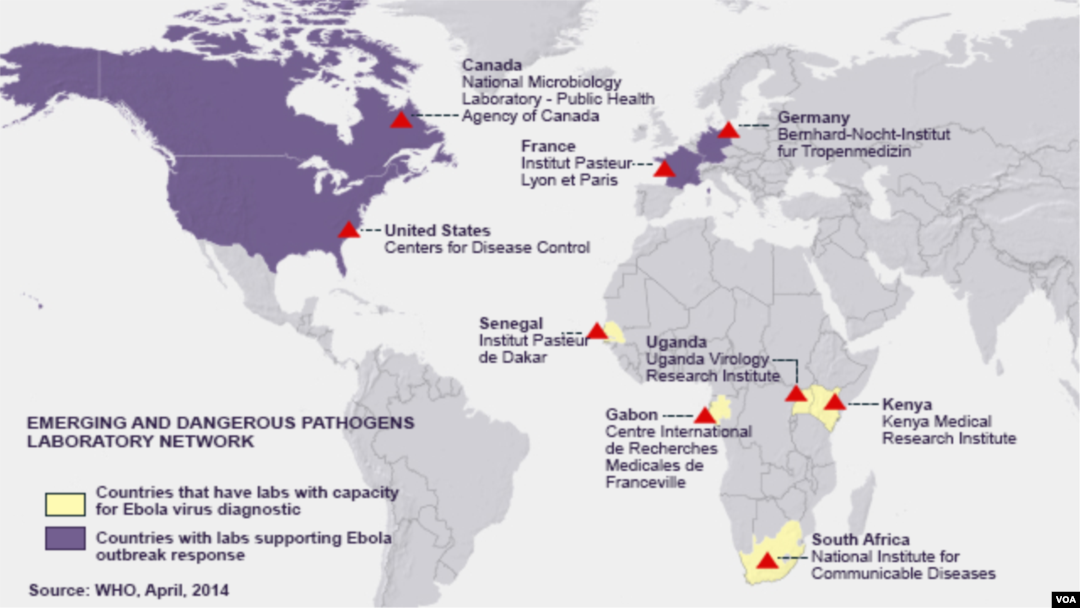Nigeria’s health minister says the administration has made strides in containing the Ebola disease by implementing a “multidimensional and Multi-sectorial” approach to combat the disease after some infected patients were successfully treated and discharged.
There have been 12 confirmed Ebola cases in Nigeria with at least four deaths.
Onyebuchi Chukwu said the government will not relent on its effort to eradicate the Ebola disease in spite of the successes of containing the virus which so far has left an estimated 1,069 people dead in four West African countries.

Ebola, labs worldwide, diagnostic and outbreak response
Increased screening
He said the government is stepping up efforts to secure the country’s borders by screening travelers who visit Nigeria at the point of entry.
"We need to secure our airports we need to secure our land borders we need to secure our seaports so that is one strategy. Right now in Lagos, we are following up on 121 secondary contacts, but none of them is symptomatic said,” said Chukwu. “So the fact that all of our cases have been primary contacts of index case shows that our containment plan is working.”
Chukwu said the government’s efforts to contain the Ebola disease should give confidence to citizens about the bid to eradicate any further infections.
“One non-Nigerian and 11 Nigerians have been diagnosed, but out of the 12, unfortunately, we have lost four, and so we have lost four including the index case. Now of the 8 that are surviving, we have actually successfully discharged five of them. We have only three that are on admission, and we have every hope they will recover. So that should give everyone confidence that we are doing the right thing,” he said.
Ebola Virus: How to Prevent Spreading the Disease
Ebola Virus: How to Prevent Spreading the Disease
- Avoid physical contact with people showing symptoms: continuous high fever, red eyes, vomiting and stomach ache.
- Wash hands thoroughly and frequently, including under the fingernails. Use soap and clean water; use hand sanitizer if soap is not available.
- Use gloves when taking care of infected patients.
- Avoid contact with raw meat; cook all animal food and by-products thoroughly.
- Avoid bush meat; avoid buying or eating the wild animals, including nonhuman primates.
- Avoid areas of known outbreaks.
- Do not touch anyone who has died from Ebola.
Sources: Centers for Disease Control and Prevention, Mayo Clinic, Plan International
Global collaboration
Chukwu said the health ministry is working with both local and international partners to contain the disease. Chukwu hailed contributions from the United States to help combat the disease, following a recent meeting with ambassador James F. Entwistle, who he said promised more assistance to help with efforts to contain the Ebola disease.
“We are working with our partners; principally the World Health Organization. They are involved in every aspect of the containment strategy along with our own people,” said Chukwu. “The U.S. Center for Disease Control and Prevention has been so wonderful in fact the U.S. government has been so supportive even I had a meeting with the American ambassador to Nigeria and he was promising more assistance.”
Some Nigerians have expressed concern about the disease, speculating that infections have increased in some parts of the country. Chukwu said that is not the case and those rumors are unsubstantiated.
He said Nigeria is cooperating with neighboring countries battling the Ebola virus including, Guinea, Liberia and Sierra Leone.
“Certainly, we will offer technical assistance,” said Chukwu. “Minister of health in West Africa will meet in Accra next week and we are going to reemphasize that we are willing to be of help to the other countries. So, surely we will offer our assistance.”


